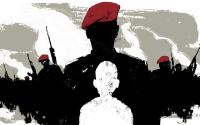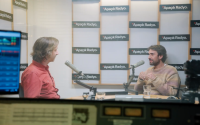Common Dreams / Published on Friday, December 19, 2003 by the International Herald TribuneTom Regan and Martin Rowe
When South African novelist J. M. Coetzee was honored with the Nobel Prize for Literature earlier this month, the world observed again a form of apartheid all too familiar to some admirers of his impressive body of work.
In 2002, we were privileged to hear Coetzee read from his Booker prize-winning novel "Disgrace," a subtly observed portrait of an academic in contemporary South Africa. Coetzee began with the observation that, although many critics had commented on the book's depiction of human relationships and violence, none had discussed the animal theme, one that appears frequently in his writing.
The virtual silence continued to reign in Oslo. When the Swedish Academy presented Coetzee with his prize, much was made (rightly so) of the human evils he documents: torture, alienation, racism, suffering. But little was spoken about what animals mean to Coetzee, the man, or Coetzee, the author.
Himself a vegetarian and described by friends as a supporter of animal rights, it is not fanciful to believe that some of his characters speak for their creator. Elizabeth Costello, the main character in Coetzee's latest novel of the same name, is a case in point. She is not the bearer of glad tidings. A "crime of stupefying proportion" is being committed every day, all around us, wherever we look or (more often) fail to look.
Forty-eight billion farm animals are killed each year around the world - nearly eight times the human population, more than 130 million a day, more than five million every hour, almost 100,000 a minute. These numbers do not include the billions of other animals whose lives are taken, bodies injured, and freedom stolen in the name of entertainment, sport, or fashion. As Costello wearily asks, how is it possible that the great mass of humanity fails to recognize what humans do to animals for the great evil that it is?
Like the Nobel awarded to writer and fellow animal advocate Isaac Bashevis Singer a quarter century ago, Coetzee's prize should shake our complacent acceptance that cruelty to others - human or non-human - is simply a matter of cultural norms. Violence is not discrete, and, as science increasingly demonstrates, suffering is no longer the exclusive experience of the human. In awarding the prize to Coetzee, the Nobel jury commented on how "in exploring weakness and defeat," Coetzee's writing managed to capture "the divine spark in man." By being such casual begetters and destroyers of the lives of animals, our "divine spark," such as it is, is surely diminished.
Uniquely, perhaps, human beings have the capacity to imagine the interior lives of others, including other animals. But as Elizabeth Costello discovers, people who invite such imagining are likely to be dismissed as sentimentalists, as anthopomorphizers, as hopelessly naïve "animal lovers." Costello, cantankerous and fragile as she is, nevertheless dares to imagine, dares to speak for the animals, even during meals when portions of their dead bodies are the centerpiece. In the company of dedicated meat-eaters, having dinner with Elizabeth Costello is everyone's worst nightmare.
We believe there is no disgrace in speaking for animals, no disgrace in caring for their treatment and demanding their liberation. Even though the taciturn, vegetarian Coetzee did not have the opportunity to mention animals in Oslo, his work urges his readers to confront, with the same unblinking eye he brings to his writing on the human condition, obscenities like factory farming, useless animal experimentation, trophy hunting and the casual way millions of surplus "pets" are euthanized each year.
As a clear-eyed chronicler of the terrible costs and tawdriness of apartheid, colonialism, war, and the breakdown of human relationships, Coetzee does not see the world through rose-tinted lenses. And nor should we. Reading Coetzee offers us the opportunity to be honest about the costs to our humanity of the casual cruelty we visit on other animals; what we fear we will lose if we stop abusing them; and what abundance and fellow feeling - and pain, too - we deny ourselves by choosing not to see.
For us to survive as a species of conscience - indeed, perhaps to survive at all - it is an opportunity that must be grasped and acted on.
Tom Regan's latest book is "Empty Cages: Facing the Challenge of Animal Rights." Martin Rowe is the author of "Nicaea: A Book of Correspondences."






